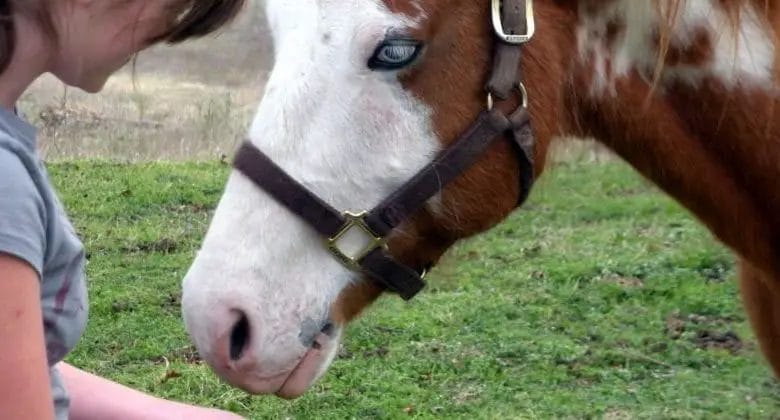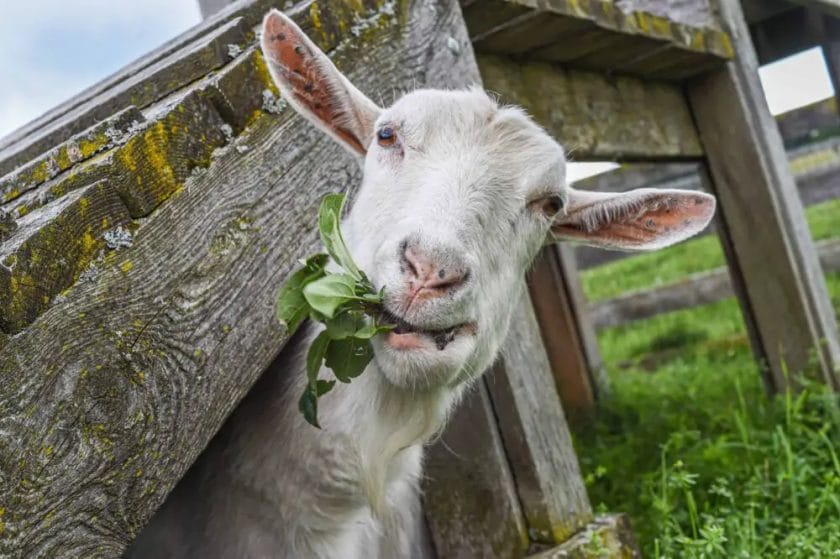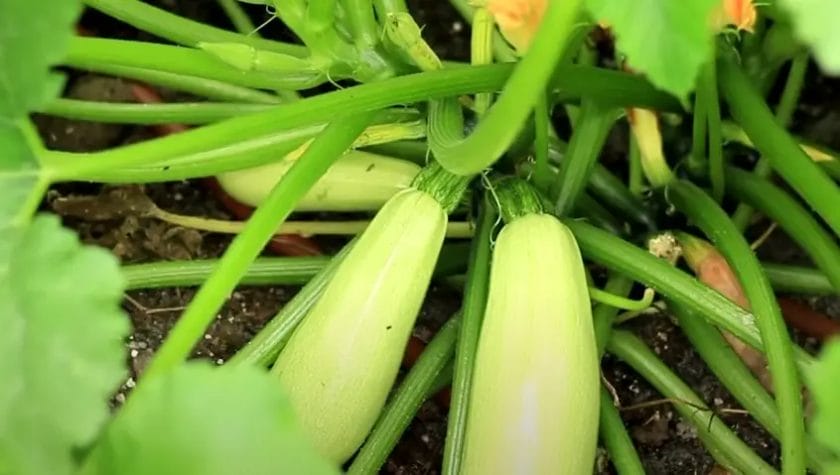Yes, goats can eat horse treats, but it’s important to consider the nutritional needs of goats when feeding them. While horse treats may be safe for goats in moderation, they should not be the sole source of their diet. Goats have different dietary requirements and need a balanced diet that includes hay, grains, and fresh forage. Consult with a veterinarian or animal nutritionist to ensure that your goats are getting the right nutrients for their overall health and well-being.

What Types of Horse Treats are Safe for Goats?
When it comes to treating our beloved animals, we all want to ensure their safety and well-being. If you have horses and goats on your property, you may be wondering if the horse treats you have on hand are safe to offer to your goats. While some horse treats can be shared with goats, it’s important to know which ones are safe and suitable for their consumption.
Goats, like horses, have unique dietary needs and preferences. While they can enjoy certain horse treats in moderation, it’s crucial to avoid feeding them anything that could be harmful. Here’s a list of horse treats that are generally safe for goats:
- Carrots: Both horses and goats enjoy the sweet crunch of carrots. These root vegetables are low in calories and high in vitamins, making them a healthy treat for both animals.
- Apples: Apples are another favorite treat among horses and goats. Be sure to remove any seeds or cores before offering them to your goats, as these can be a choking hazard.
- Oats: Rolled oats or oat-based treats are safe for goats, as long as they are given in moderation. Oats are a good source of fiber and can be a tasty snack for your goats.
- Pumpkin: Goats can also enjoy small amounts of pumpkin as a treat. Pumpkins are rich in vitamins and minerals, and they can provide a healthy addition to their diet.
- Peppermints: While peppermints are safe for horses, they should be given sparingly to goats. These sweet treats should be given as an occasional indulgence, as they can be high in sugar.
It’s important to note that while these treats are generally safe for goats, they should still be given in moderation. Goats have sensitive digestive systems, and overfeeding them with treats can lead to health issues such as bloating or diarrhea. Always consult with a veterinarian to ensure you are providing the right balance of treats and a proper diet for your goats.
When offering horse treats to your goats, it’s also essential to consider any potential allergies or sensitivities they may have. Some goats may have specific dietary restrictions or health conditions that require a more specialized diet. It’s always best to consult with a professional to determine the most appropriate treats for your individual goats.
In summary, while certain horse treats can be shared with goats, it’s crucial to choose ones that are safe and suitable for their consumption. Carrots, apples, oats, pumpkin, and peppermints are generally safe options, but always feed them in moderation. Ensure you are aware of any dietary restrictions or health conditions your goats may have, and consult with a veterinarian for personalized advice.

How to Introduce Horse Treats to Goats
Introducing horse treats to goats can be a great way to provide them with a special treat and enhance their diet. However, it is important to introduce these treats properly to ensure the safety and well-being of the goats. Here are some steps to follow when introducing horse treats to goats:
1. Choose the Right Treats
Before introducing horse treats to goats, it is essential to choose the right treats that are safe and suitable for them. Avoid treats that contain ingredients that may be harmful to goats, such as chocolate or artificial sweeteners. Opt for natural and healthy treats that are specifically formulated for horses and are safe for goats to consume.
2. Start with Small Quantities
When introducing horse treats to goats, it is crucial to start with small quantities to assess their response and tolerance. Give them a small piece of the treat and observe how they react. If they show any signs of discomfort or digestive issues, discontinue the treat immediately and consult a veterinarian if necessary.
3. Monitor the Goats’ Behavior
Keep a close eye on the goats’ behavior after introducing the horse treats. Monitor their eating habits, digestion, and overall well-being. If they continue to show positive responses and no adverse effects, you can gradually increase the quantity of the treat over time.
4. Offer Treats as a Reward
One way to introduce horse treats to goats is by offering them as a reward during training sessions or as a positive reinforcement for desired behavior. This can help create a positive association with the treats and make the goats more receptive to them.
5. Consider Health Issues and Dietary Restrictions
Before introducing horse treats to goats, it is important to consider any existing health issues or dietary restrictions they may have. Some goats may have specific dietary needs or conditions that require avoiding certain ingredients or treats. Consult with a veterinarian to ensure the treats you choose are suitable for your goats’ individual needs.
6. Use Treats in Moderation
While horse treats can be a tasty and enjoyable addition to a goat’s diet, it is important to use them in moderation. Treats should not replace the goats’ regular diet or be given excessively. Too many treats can lead to nutritional imbalances and health issues. Follow the recommended feeding guidelines provided by the treat manufacturer and adjust accordingly based on your goats’ specific needs.
7. Introduce Variety
It can be beneficial to introduce a variety of horse treats to goats to provide them with different flavors and textures. This can help prevent them from getting bored with the treats and add some excitement to their diet. However, always ensure that the treats are safe and suitable for goats before offering them.
In summary, introducing horse treats to goats can be a fun and nutritious addition to their diet. By following these steps and considering the goats’ individual needs, you can safely introduce treats and provide them with a special treat that they will love.

4. Potential Risks and Precautions When Feeding Goats Horse Treats
Feeding treats to our beloved goats can be a rewarding experience. It not only helps in building a bond with them but also serves as a way to provide additional nutrition. However, it is important to be cautious and aware of the potential risks and precautions associated with feeding goats horse treats.
While some horse treats may seem harmless, it is crucial to remember that goats have different dietary requirements and digestive systems compared to horses. Here are some potential risks to consider when offering horse treats to goats:
1. Digestive Issues
Goats have sensitive digestive systems that are designed to process plant-based materials efficiently. Horse treats may contain ingredients that are not suitable for goats, such as grains or artificial additives. These ingredients can lead to digestive issues like bloating, diarrhea, or even colic in goats.
2. Nutritional Imbalance
Horse treats are formulated to meet the nutritional needs of horses, which differ from those of goats. Feeding horse treats to goats can cause an imbalance in their diet, leading to deficiencies or excesses of certain nutrients. This imbalance can have adverse effects on their overall health and well-being.
3. Choking Hazard
Some horse treats may be larger in size or have hard textures that can pose a choking hazard for goats. Goats tend to gulp down their food quickly, increasing the risk of choking on larger treats. It is important to choose treats that are appropriately sized and easily chewable for goats.
Precautions to Take:
To ensure the safety and health of your goats when feeding them horse treats, it is essential to follow these precautions:
- Consult a veterinarian: Before introducing any new treats to your goats’ diet, consult a veterinarian who specializes in goat nutrition. They can provide guidance on suitable treats and quantities based on the specific needs of your goats.
- Read ingredient labels: Always read the ingredient labels of horse treats to identify any potential harmful ingredients or additives. Avoid treats that contain grains, artificial colors, or preservatives.
- Choose goat-specific treats: Opt for treats specifically formulated for goats, as they are more likely to meet their nutritional requirements. These treats are designed with the goat’s digestive system in mind and are less likely to cause any digestive issues.
- Monitor portion sizes: Feed horse treats to goats in moderation. Giving too many treats can lead to an imbalance in their diet and can have negative effects on their health. Follow the recommended portion sizes provided by the treat manufacturer or as advised by your veterinarian.
- Observe your goats: After introducing horse treats to your goats’ diet, closely monitor their behavior and health. Look out for any signs of digestive issues, such as changes in appetite, diarrhea, or discomfort. If you notice any adverse reactions, discontinue the treats immediately and consult your veterinarian.
In summary, while feeding horse treats to goats may seem like a fun and rewarding activity, it is important to be aware of the potential risks and take the necessary precautions. Understanding goats’ unique dietary needs and consulting a veterinarian can help ensure that treats are given safely and without compromising their health.
Alternative Treats for Goats: Healthy and Nutritious Options
When it comes to keeping goats happy and healthy, providing them with a well-balanced diet is essential. While hay, grass, and grains are the main staples of a goat’s diet, offering them alternative treats can be a great way to provide variety and additional nutrients. In this section, we will explore some healthy and nutritious options for goat treats.
Fruits and Vegetables
Just like humans, goats can benefit from the vitamins and minerals found in fruits and vegetables. Some safe options for goat treats include:
- Apples: Cut them into small pieces, removing any seeds or core.
- Carrots: Offer them raw or cooked, chopped into bite-sized pieces.
- Bananas: Peel them and slice them into small chunks before feeding.
- Pumpkins: Cut into manageable portions, remove the seeds and skin.
- Watermelons: Remove the seeds and rind, and serve the flesh in small quantities.
Remember to introduce new fruits and vegetables gradually, as sudden changes in diet can cause digestive upset in goats. Always wash produce thoroughly to remove any pesticides or chemicals.
Herbs and Weeds
Goats are natural foragers and enjoy nibbling on various plants, herbs, and weeds. Some safe options for goat treats include:
- Mint: Goats love the refreshing taste of mint leaves, which also aids in digestion.
- Dandelion: This common weed is high in vitamins A and C and is a favorite among goats.
- Nettles: Rich in iron, calcium, and other minerals, nettles can be a nutritious treat.
- Rosemary: The strong aroma of rosemary is appealing to goats and can have antibacterial properties.
- Thistle: Goats can snack on thistle leaves, which are high in nutrients like vitamin K and manganese.
Ensure that any plants or weeds you offer to your goats are free from pesticides, herbicides, or other harmful chemicals.
Grains and Seeds
While grains are a staple in a goat’s diet, they can also be offered as treats in moderation. Some safe options for goat treats include:
- Oats: Rolled or whole oats can be offered as a tasty snack and provide extra energy.
- Sunflower seeds: These seeds are high in protein and healthy fats, making them a nutritious treat.
- Barley: Cooked or sprouted barley can be a tasty option for goats, packed with vitamins and minerals.
- Peanuts: Raw, unsalted peanuts can be given as treats, but be sure to remove the shells.
- Flax seeds: These tiny seeds are a great source of omega-3 fatty acids and can benefit a goat’s overall health.
Remember not to overfeed your goats with grains and seeds, as they should still make up a small portion of their overall diet.
Treats to Avoid
While it’s important to provide goats with treats to keep them happy, there are certain foods that should be avoided. Some treats that are toxic to goats include:
- Chocolate: Contains theobromine, which is toxic to goats.
- Avocado: Contains a substance called persin, which is toxic to many animals, including goats.
- Caffeine: Found in coffee and tea, caffeine can be harmful to goats if consumed in large quantities.
- Onions and garlic: These can cause anemia in goats if ingested in large amounts.
- Rhubarb leaves: The leaves contain toxic substances and should not be fed to goats.
In summary, providing alternative treats for goats can help add variety to their diet and provide them with additional nutrients. Fruits, vegetables, herbs, and grains can all be offered as treats in moderation. Remember to introduce new foods gradually and avoid toxic treats that can harm your goats. By offering healthy and nutritious options, you can keep your goats happy and thriving.
FAQs
1. Can goats eat horse treats?
Generally, goats can eat horse treats in small quantities as an occasional treat. However, it’s important to check the ingredients to ensure they don’t contain any harmful substances for goats. Goats have different nutritional needs than horses, so it’s best to feed them a balanced diet specific to their requirements.
2. How often should I trim my goat’s hooves?
Goat hooves should be trimmed every 6-8 weeks to prevent overgrowth, discomfort, and potential hoof problems. Regular hoof trimming helps maintain the goat’s overall health and mobility. It’s a good practice to observe the hooves regularly and look for signs of overgrowth or hoof issues that may require trimming before the scheduled time.
3. Can goats eat apples?
Yes, goats can eat apples. Apples can be a healthy and tasty treat for goats when given in moderation. However, make sure to remove the seeds and core as they can be harmful. As with any new food, introduce apples gradually and watch for any negative reactions or digestive issues.
Conclusion:
In conclusion, while goats can eat a variety of foods, including horse treats, it is important to exercise caution. Goats have sensitive digestive systems and should not consume large amounts of sugary or high-fat treats designed for horses. These treats may lead to digestive issues or obesity in goats. It is always recommended to provide goats with a balanced and nutritious diet specific to their needs. If you do choose to give horse treats to your goats, ensure it is done in moderation and as an occasional indulgence, taking into consideration their overall health and well-being.
Remember, the health and care of your goats should be your top priority. Providing them with a balanced diet, appropriate treats, and regular veterinary check-ups will help ensure their long-term health and happiness. So, enjoy spoiling your goats, but do so responsibly!
